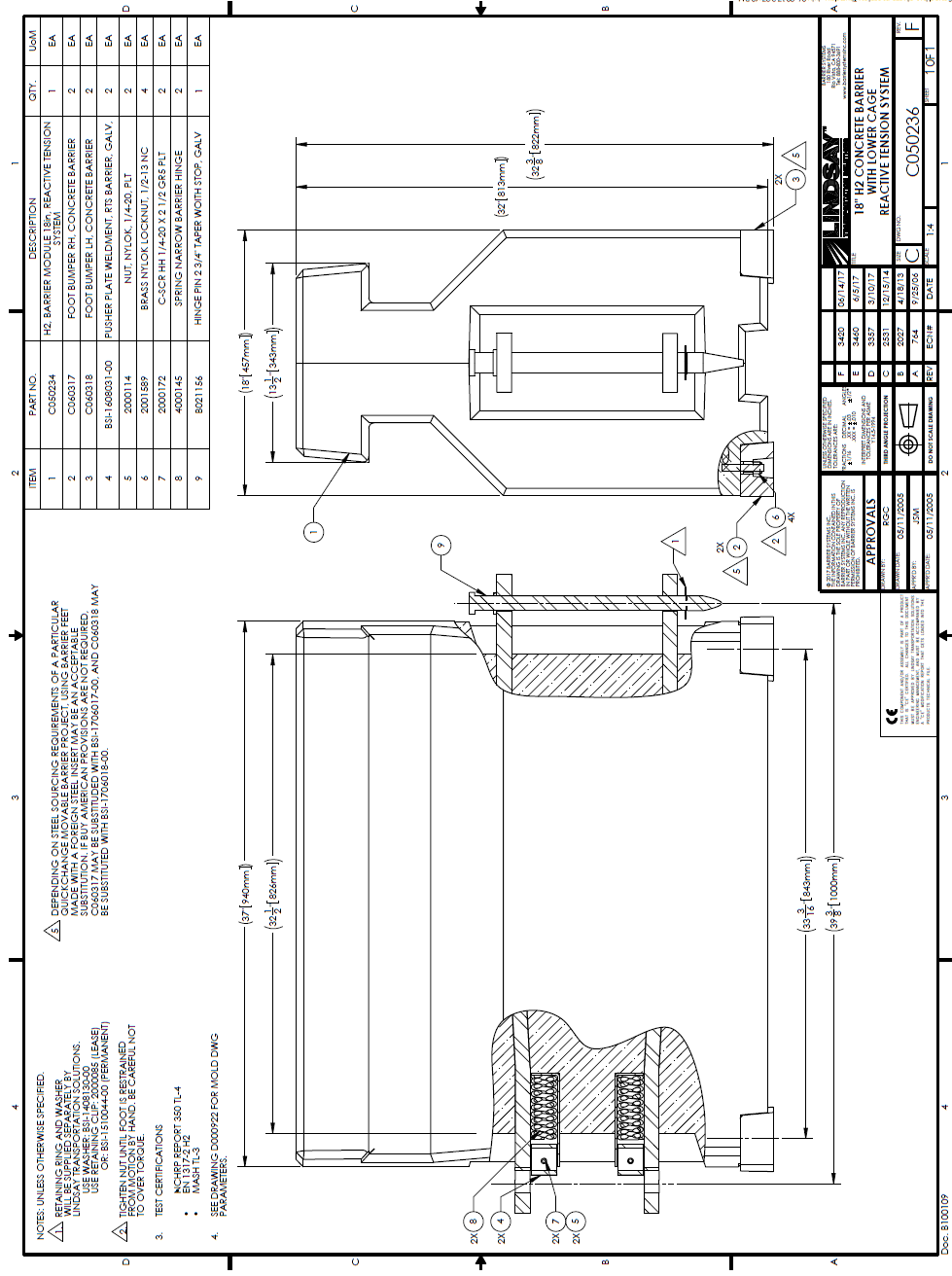 TB 170711 Rev. 2
Page 1 of 3
APPROVED
TB 170711 Rev. 2
Page 1 of 3
APPROVED
Concrete Reactive Tension System-Quickchange Moveable Barrier
(CRTS-QMB) MASH TL-3
1982
Specification
ACT
The Concrete Reactive Tension System-Quickchange Moveable Barrier (CRTS-
QMB) has been fully tested to the Manual for Assessing Safety Hardware (MASH)
for Test Level 3. The barrier is designed to meet the rigid requirements of
deployment in moveable barrier applications where positive separation
technology is required and where lane widths and lateral space are limited.
Description
INFORMATION
Each barrier element of the CRTS-QMB shal be 810 mm (32") high, 460 mm
(18") wide and 1000 mm (39") long (Attachment, Figure 1, C050236). The
individual elements shal weigh approximately 680 kg (1500 pounds) and rest on
four rubber feet to increase the coefficient of friction between the barrier
element and the road surface.
OFFICIAL
The barrier elements are connected in an end-to-end fashion with tensioning
hinge mechanisms and steel pins. The minimum length of need (LON) for the
CRTS-QMB MASH TL-3 barrier is 170m
THE or 170 barrier segments. The Beginning
of Length of Need (BLON) is 85m or 85 barrier segments. The performance
characteristics of CRTS-QMB when impacted closer to the upstream and
downstream ends of the instal ation were further evaluated using dynamic finite
element analysis and simulation software LS-DYNA to MASH parameters. The
performance characteristic
UNDER s for reduced LON conditions may be reviewed in
Technical Brief TB 170207 Rev. 0.
Materials
The primary elements of the CRTS-QMB shal be constructed of ASTM A-36 steel
and high strength concrete. Al external steel shal be stainless steel or hot
dipped galva
RELEASED nized in accordance with ASTM, A 123 or ASTM B 695, except
miscel aneous hardware which may be painted, stainless steel, brass, or zinc
plated. Al structural welds shal be continuous.
1/8/2019
TB 170711 Rev. 2
Page 2 of 3
CONSTRUCTION METHODS: Barriers wil be manufactured by either the
wetcast or drycast methods. Minimum concrete 28-day compressive strength
shal be 276 bar (4,000 psi). Al surface voids or rock pockets shal be repaired.
Surface “bugholes” caused by trapped air bubbles shal be permitted. Air
entrainment shal be as specified by the ordering agency,
1982
+/- 1.50 %.
System Requirements
ACT
The CRTS-QMB system, when instal ed in accordance with the manufacturer’s
instructions, shal function as a longitudinal barrier and be able to safely contain
and redirect 1100 kg (2420 lb) and 2270 kg (5000 lb) vehicles impacting the
barrier at 100 km/hr (62.1 mph) and 25 degrees in accordance with the Manual
for Assessing Safety Hardware (MASH) Test Level 3 and EN 1317 H2.
The system shal minimize lateral displacement upon impact. The system shal
minimize clearance between barrier hinges, resulting in a nominal metal to metal
INFORMATION
connection. During impact by an errant vehicle, the tension in the barrier system
resists the penetration of the vehicle and limits the lateral displacement of the
barrier.
Reactive Tension System Variable Length Barriers (RTS-VLBs) shal be added to
the length of the CRTS-QMB instal ation in order to al ow a smooth lateral
OFFICIAL
transfer through the Barrier Transfer Machine. The number and location of VLB
units that shal be required wil vary depending on specifics of the application,
number and degree of curves, changes in elevation, etc.
THE
UNDER
RELEASED
1/8/2019
 TB 170711 Rev. 2
Page 3 of 3
TB 170711 Rev. 2
Page 3 of 3
1982
ACT
INFORMATION
OFFICIAL
THE
UNDER
RELEASED
1/8/2019
Document Outline

